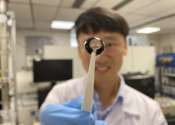Sound-powered sensors stand to save millions of batteries
Sensors that monitor infrastructure, such as bridges or buildings, or are used in medical devices, such as prostheses for the deaf, require a constant supply of power. The energy for this usually comes from batteries, which ...
Jan 29, 2024
0
76









